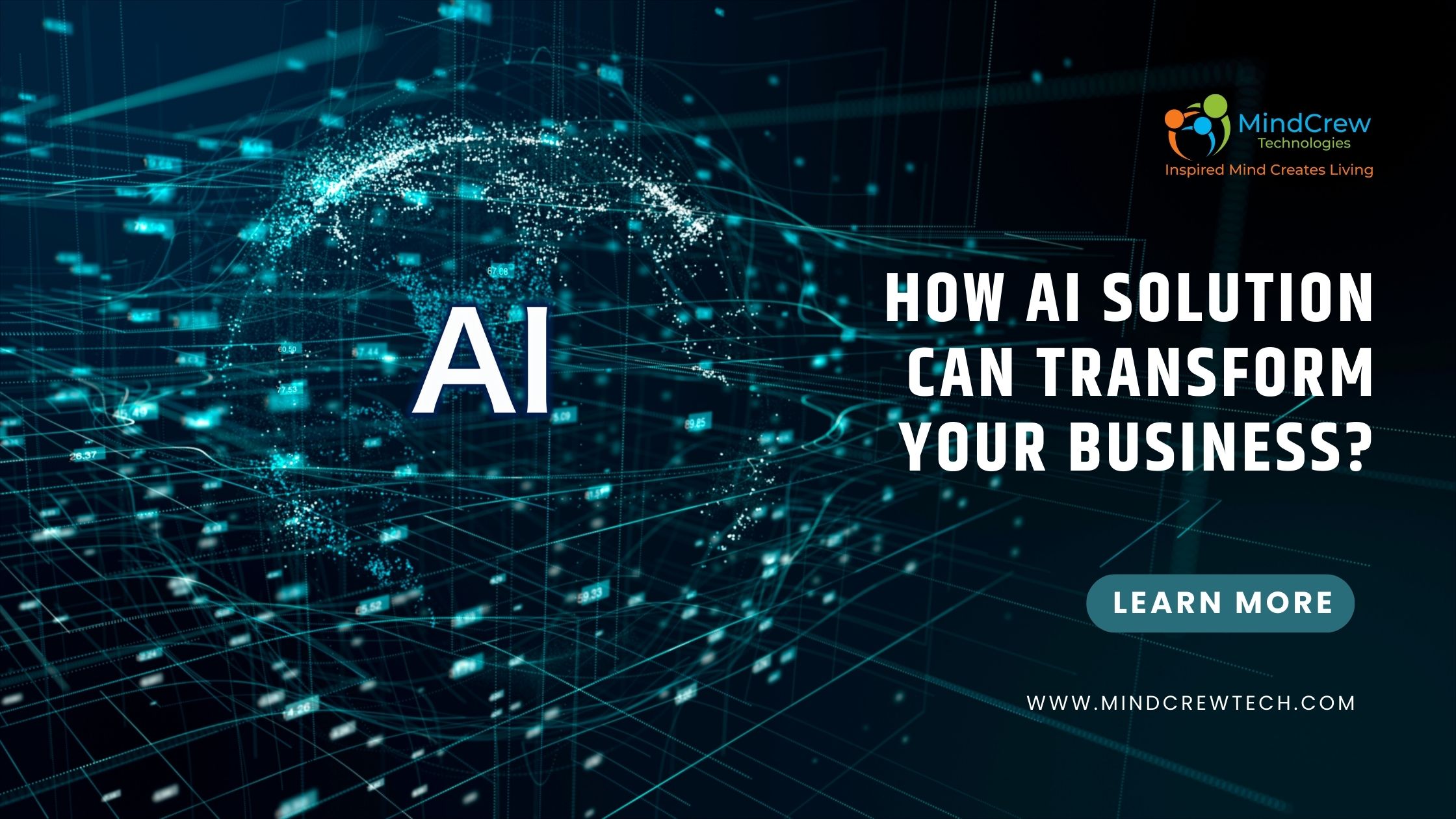How AI Solution Can Transform Your Business?
With rapid advancements in technology, it’s no surprise that artificial intelligence (AI) has become an integral part of our daily lives. From voice assistants like Siri and Alexa to self-driving cars revolutionising transportation, AI is transforming industries across the board. But what does this mean for your business? In this blog post, we’ll explore how AI innovation can catapult your organisation into new realms of success and efficiency. Get ready to discover the endless possibilities as we delve into the ways AI can revolutionise your business operations, streamline decision-making processes, and unlock untapped potential. The future is here – are you ready to embrace it?
Introduction to AI & Machine Learning
In recent years, artificial intelligence (AI) and machine learning have become increasingly important topics in the business world. As these technologies have become more sophisticated, they have begun to transform businesses in a variety of ways.
One of the most significant ways AI is impacting businesses is through its ability to automate tasks. This can free up employees to focus on other tasks that are more value-added for the company. For example, a customer service representative might use an AI chatbot to handle routine inquiries from customers, freeing up their time to handle more complex issues.
AI can also be used to improve decision-making within a company. By analyzing data more quickly and accurately than humans could, AI can help managers make better decisions about where to allocate resources and how to respond to market changes.
AI can also help businesses create new products and services. By understanding customer needs and preferences better than humans can, AI can help businesses develop new offerings that are more likely to be successful with customers.
Challenges of AI Adoption
AI adoption can be difficult for companies because it requires significant changes to business processes and IT infrastructure. In addition, AI technology is still in its early stages of development and can be expensive to implement. Additionally, there are ethical concerns about AI that need to be addressed.
1. High Cost:
AI technology requires a significant investment in hardware, software, and personnel. Additionally, there is the cost of training and ongoing maintenance for the system.
2. Technical Challenges:
The implementation of AI can involve complex algorithms and data structures that require a deep understanding of machine learning and data science. This can be difficult for companies without the necessary expertise to handle such tasks.
3. Security Concerns:
AI systems can be vulnerable to attack from malicious actors if not properly secured. This can cause serious disruption to business operations if not addressed quickly.
4. Ethical Considerations:
As AI becomes more prevalent in our lives, ethical considerations must be taken into account when implementing AI technology. These include ensuring privacy of user data, protecting against bias in algorithms, and avoiding potential harms caused by autonomous systems.
Benefits of AI and Machine Learning Solutions
AI and machine learning solutions offer a number of benefits for businesses. Perhaps most importantly, they can help businesses to automate tasks which would otherwise need to be carried out by human employees. This can lead to significant cost savings, as well as increased efficiency and productivity. In addition, AI and machine learning can help businesses to make better decisions, by providing them with access to vast amounts of data which would be impossible for humans to process. AI and machine learning can also help businesses to improve their customer service, by providing customers with more personalized experiences.
In addition, AI and machine learning can help to detect patterns and trends in data that humans may not be able to spot. This can enable businesses to make more informed decisions, as well as identify potential opportunities for growth. Furthermore, AI and machine learning can help businesses to enhance security by identifying malicious or suspicious activity quickly and accurately.
AI Investment Strategies for Businesses
In recent years, AI has become one of the hottest investment opportunities for businesses and venture capitalists alike. With the rapid advancement of AI technology, businesses are looking to get in on the action and reap the benefits of this transformative new tool.
However, with so many different AI applications and startups out there, it can be difficult to know where to invest your money. In this article, we will share some tips on how to identify promising AI investment opportunities and make the most out of your investment.
1. Look for companies that are using AI to solve real-world problems
There are a lot of businesses that claim to be using AI but are really just using it as a marketing gimmick. When evaluating an AI startup, take a close look at what they are actually doing with their technology. Are they using it to improve their product or service? Are they using it to automate tasks or processes? Or are they just using it for data collection and analysis? The more practical the application of their AI technology, the more likely it is that the company will be successful.
2. Consider the team behind the company
A good team is essential for any startup, but it’s especially important in the case of an AI company. This is because developing successful AI requires not only technical expertise but also a deep understanding of artificial intelligence principles. When assessing an AI startup, pay close attention to the qualifications and experience of the team members. Do they have experience in AI or a related field? Do they have industry experience? Do they have any publications or patents? All of these factors can give you an indication of how competent and successful the team is likely to be.
3. Evaluate the company’s track record
When considering an AI investment, it’s important to assess the company’s past performance as well. Has the company achieved any milestones so far? Have they launched any products or services? What kind of traction have they gotten with their existing customers? Looking at past performance can provide important insights into how successful the company is likely to be going forward.
4. Analyze the competition
No matter what type of business you are investing in, it’s always important to understand who else is operating in the same space. Is there a dominant player in the market, or are there numerous smaller competitors? How do their offerings compare with those of your target company? Knowing your competition can help you make smarter decisions about where to invest your money and whether or not it makes sense for you to get involved in this particular space.
The Role of Human-Machine Collaboration in AI Innovation
Innovation has always been key to business success, and in the age of artificial intelligence (AI), that’s more true than ever. AI is transforming businesses across industries, and those who embrace it will be the leaders of the future. But what does AI innovation look like?
For businesses, AI innovation means harnessing the power of machine learning to automate tasks, improve efficiency, and drive growth. It also means understanding how to best use AI-powered tools and services to achieve specific business goals. And it requires a willingness to experiment with new technologies and approaches.
But perhaps most importantly, AI innovation requires a human touch. After all, machines are only as good as the data they’re given, and humans are still the best source of high-quality data. That’s why successful AI initiatives depend on strong collaboration between humans and machines.
The best AI solutions are those that combine the strengths of both humans and machines. Machines can process large amounts of data quickly and identify patterns that would be difficult for humans to spot. Humans, on the other hand, have the ability to provide context for data and make decisions based on ethical considerations.
When humans and machines work together, they can create powerful solutions that neither could create on their own. That’s why businesses need to focus on human-machine collaboration if they want to succeed with AI.
Examples of Businesses that have Benefited from AI
1. Businesses in the retail industry are using AI to create more personalized shopping experiences for customers and to streamline their own operations.
2. Financial institutions are using AI to detect and prevent fraud, as well as to provide better customer service.
3. Healthcare organizations are using AI to improve patient care and to speed up the diagnosis of diseases.
4. Manufacturers are using AI to improve the quality of their products and to reduce production costs.
5. Transportation companies are using AI to route vehicles more efficiently and to prevent accidents.
The Future of Artificial Intelligence
The future of artificial intelligence is very exciting. With the rapid advancements in technology, AI is becoming more and more sophisticated and is being used in a variety of different ways. Businesses are beginning to use AI to automate tasks, gain insights from data, and improve customer experiences.
As AI continues to evolve, it will become even more powerful and transformative. Here are some ways that AI will continue to innovate and change businesses:
1. Automation of tasks:
AI can help businesses automate tasks that are time-consuming or repetitive. This can free up employees to focus on other tasks that require human interaction or creative thinking.
2. Insights from data:
AI can help businesses make sense of large amounts of data. By analyzing data, businesses can gain insights into trends, customer behavior, and much more. This information can be used to make better decisions about products, marketing, and operations.
3. Improved customer experiences:
AI can be used to personalize customer experiences and create more engaging interactions. For example, chatbots can be used to answer customer questions or provide recommendations. In the future, AI will become even better at understanding customers and providing them with the best possible experience.
4. New products and services:
As AI becomes more advanced, businesses will be able to create new products and services that were previously not possible. For example, we may see the development of completely new types of transportation or medical treatments that are powered by AI
Conclusion
AI innovation is a powerful tool that can be used to transform businesses in ways that were never thought possible. We’ve highlighted some of the key benefits and applications of AI, as well as the challenges it poses to organizations looking to embrace this cutting-edge technology. It is important for businesses to carefully consider their options when it comes to embracing AI and developing strategies that align with their goals and objectives. With careful implementation, companies can use AI innovation to drive greater efficiency, improved customer experiences, and increased profitability — ensuring success in today’s rapidly changing digital landscape.







